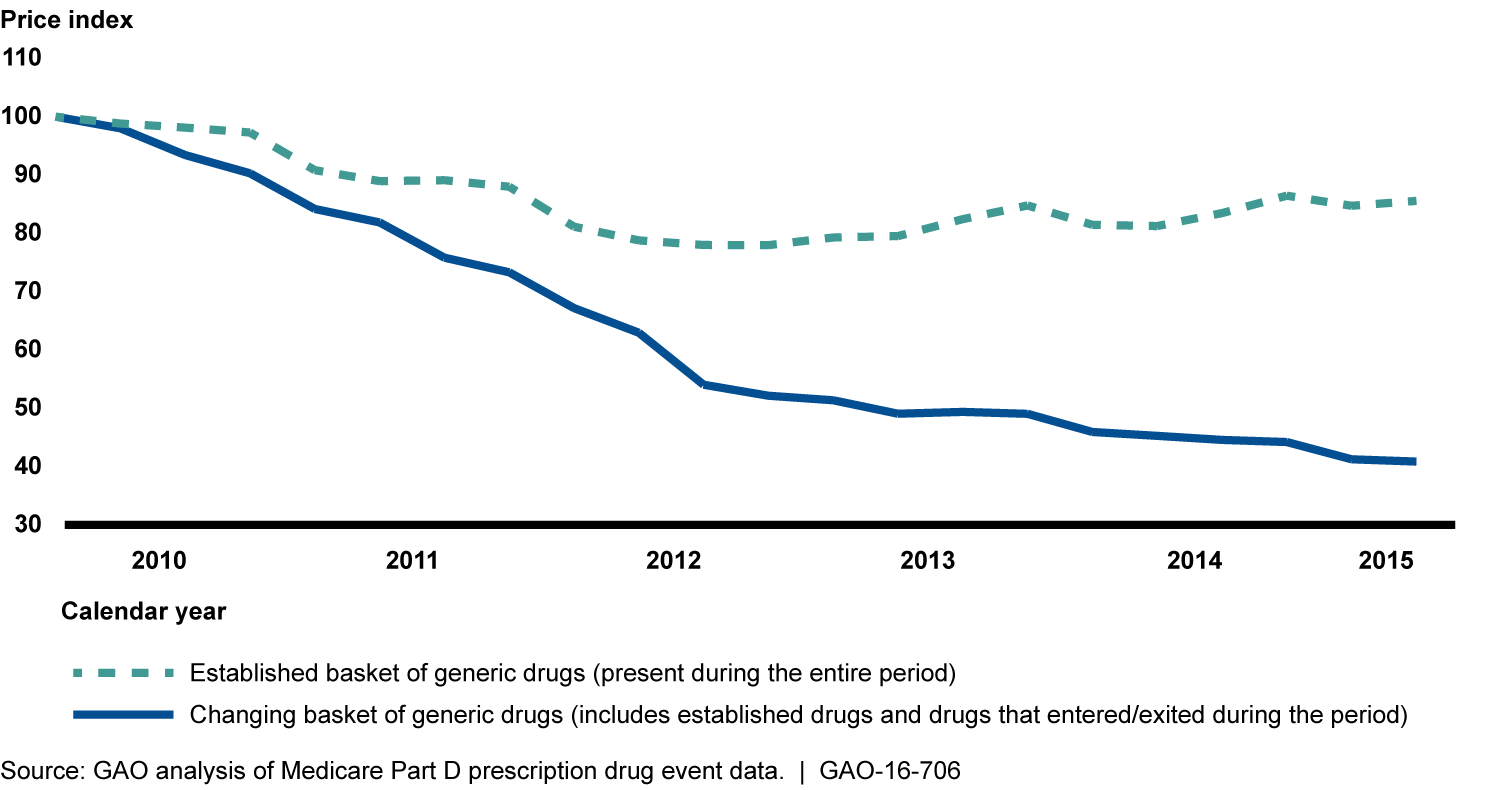Generic Drugs Under Medicare: Part D Generic Drug Prices Declined Overall, but Some Had Extraordinary Price Increases
Highlights
What GAO Found
Generic drug prices declined overall under Medicare Part D—the voluntary outpatient prescription drug program administered by the Centers for Medicare & Medicaid Services within the Department of Health and Human Services (HHS)—since 2010. Specifically, generic drug prices fell 59 percent from the first quarter of 2010 through the second quarter of 2015. This decline reflects a changing basket of 2,378 unique generic drugs, including those that came into or exited the market during this period. GAO also analyzed an established basket of 1,441 generic drugs that were present during the entire period of analysis. Unlike the larger changing basket of drugs, prices of established generics decreased moderately and then increased slightly (see figure). The steeper price decrease for the changing basket of generic drugs is at least partially attributable to more rapid price declines among new generic drugs as they enter the market.
Medicare Part D Generic Drug Price Trends for All Generics and Established Generics, First Quarter 2010 to Second Quarter 2015

More than 300 of the 1,441 established generic drugs analyzed had at least one extraordinary price increase of 100 percent or more between first quarter 2010 and first quarter 2015. GAO found that drugs with extraordinary price increases moderated the overall decline in generic drug prices. Additionally, the extraordinary price increases generally persisted for at least 1 year and most had no downward movement after the extraordinary price increase. Given the low cost of generic drugs relative to their brand counterparts, stakeholders indicated limited changes to benefit design, including drug coverage.
Manufacturers reported that competition, determined by the price and availability of the same drug from other manufacturers, is the primary driver of generic drug prices, as less competition could drive prices higher. Stakeholders noted that the level of competition in the generic drug market is influenced by a variety of factors, including raw material shortages, production difficulties, consolidation among manufacturers, and a backlog of new generic drug applications awaiting federal review.
Why GAO Did This Study
Medicare is the largest public payer for prescription drugs, representing 29 percent of total retail prescription drug spending in 2014. Generic prescription drugs have been a source of cost savings for the U.S. health care system due to their lower costs relative to brand-name drugs. However, recent price increases of certain generics may limit cost savings.
GAO was asked to examine price trends for generic drugs and the factors that affect prices. This report describes 1) how generic drug prices under Medicare Part D have changed over time; 2) the extent to which generic drugs under Medicare Part D experienced extraordinary price increases, the persistence of any increases, and their effect on benefit design; and 3) the factors stakeholders identified as contributing to price changes.
GAO analyzed Medicare Part D claims data from the first quarter of 2010 through the second quarter of 2015, the most recent data available. Based on the data, GAO created price indexes to show price trends; determined the number of drugs that had an extraordinary price increase of 100 percent or more; and tracked whether the increased price remained at 100 percent or more for an additional year. GAO also interviewed drug manufacturers, Medicare Part D plan sponsors, pharmacy benefit managers, relevant trade associations, and economics experts to identify factors contributing to generic drug price changes.
HHS reviewed a draft of this report and provided technical comments, which were incorporated as appropriate.
For more information, contact John Dicken at (202) 512-7114 or dickenj@gao.gov.
